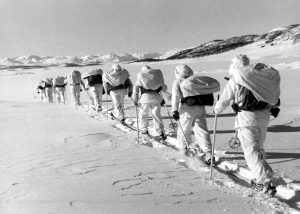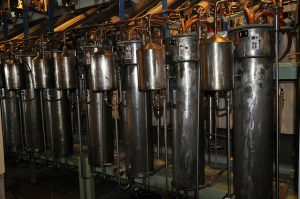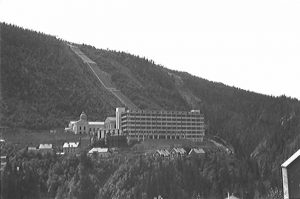 Nine parachutes floated silently to the Earth on a calm February 27, 1943. Their mission was to blow up a Nazi-controlled heavy water plant in Vemork, Norway. The men had been specially trained by British Special Operations, and they had been chosen to carry out this vital mission. Heavy water was a crucial element in the production of plutonium, an ingredient for the nuclear bomb Hitler’s scientists were feverishly attempting to build. The plant at Vemork was the only such facility in the world.
Nine parachutes floated silently to the Earth on a calm February 27, 1943. Their mission was to blow up a Nazi-controlled heavy water plant in Vemork, Norway. The men had been specially trained by British Special Operations, and they had been chosen to carry out this vital mission. Heavy water was a crucial element in the production of plutonium, an ingredient for the nuclear bomb Hitler’s scientists were feverishly attempting to build. The plant at Vemork was the only such facility in the world.
The plant at Vemork was heavily fortified, and it remoteness made it impervious to bombing. It could only be destroyed on site, and for the men, parachuting in was just the beginning of the mission. The men would also be required to scale a 500-foot-high cliff in the dead of winter, and infiltrate a heavily guarded basement laboratory. The nine Norwegians, led by 23 year old Joachim Ronneborg, did just that, successfully detonating  explosives that shut down the facility. The destruction of the Vemork plant was crucial in Albert Speer’s decision to halt attempts to produce a Nazi atomic weapon.
explosives that shut down the facility. The destruction of the Vemork plant was crucial in Albert Speer’s decision to halt attempts to produce a Nazi atomic weapon.
The United States began early nuclear research first, but Germany was moving forward with its own nuclear energy research and atomic bomb program. In April 1939, Germany began a secret program called the Uranverein or “Uranium Club.” The German program recruited some of the top scientific minds in Germany, including recent Nobel Prize winner Werner Heisenberg. It was led by physicist Kurt Diebner. The Uranium Club was getting dangerously close to making an atomic weapon, and it had to be stopped. Hitler could not win this one.
Had nine Norwegian soldiers not trekked into the cold on that day in February 1943, it is hard to say how much  longer the war might have lasted, or how much destruction might have been carried out. Their brave and selfless act saved many lives to be sure. At the very least, Operation Gunnerside should be recognized as one of the most successful SOE missions during World War II. Ronneborg and his squad fully expected this mission to be a one-way trip. It never occurred to them that they might survive. Nevertheless, the operation brought with it zero casualties, and temporarily destroyed the Germans’ single source of heavy water at the time. Ronneborg later commented that “London could have suffered a different fate and ended up ‘looking like Hiroshima’ if his team had failed.”
longer the war might have lasted, or how much destruction might have been carried out. Their brave and selfless act saved many lives to be sure. At the very least, Operation Gunnerside should be recognized as one of the most successful SOE missions during World War II. Ronneborg and his squad fully expected this mission to be a one-way trip. It never occurred to them that they might survive. Nevertheless, the operation brought with it zero casualties, and temporarily destroyed the Germans’ single source of heavy water at the time. Ronneborg later commented that “London could have suffered a different fate and ended up ‘looking like Hiroshima’ if his team had failed.”


Leave a Reply